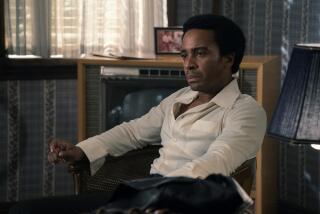U.S. cigar-makers puffing to meet demand : Celebrity smokers are helping boost sales of premium stogies 44%. In Miami’s Little Havana, tabaqueros revive a Cuban tradition.
- Share via
MIAMI — About the only thing rising faster than the smoke from Kevin Doyle’s Havana Classico are his sales figures. “There is a voracious demand for product,” he says between puffs on the 6 1/4-inch torpedo. “Amazing demand.”
Doyle, 37, is standing in the Calle Ocho storefront factory of his Caribbean Cigar Co. Just six months ago, this was a fading furniture outlet; it is now the largest hand-rolled cigar manufacturing plant in the United States.
At long wooden benches, 40 men and women--almost all Cuban-born, and many recent immigrants--are nimbly cutting, bunching and rolling golden-brown leaves of tobacco into panatellas and coronas, feeding a still-surging American hunger for a good cigar. “I think it was seeing all those movie stars smoking,” says tabaquero Jose Antonio Perez, offering his theory for the venerable cigar’s exploding popularity.
Cigars are hot, especially the expensive type. In the first quarter of this year, according to the Cigar Assn. of America, sales of premium cigars--hand-rolled and costing up to $25 apiece--are up 44% and heading for another record. Last year, premium cigar sales topped 163 million units, up 30% over 1994.
“The demand is just accelerating,” says Norman Sharp, president of the Washington-based cigar association, “and the back-order situation is getting worse.”
That demand has sparked a revival of the traditional Cuban art of hand-rolling cigars. By year’s end, Doyle says, Caribbean Cigar Co. will double its work force. And half a dozen other, smaller Miami operations are rushing to keep up.
“The business has gone through the roof. Totally insane,” says Jorge Padron, 28-year-old vice president of Padron Cigars, which was started here in 1964 by his Cuban-born father, Jose Orlando Padron. “We get calls every day from people who want to open shops and carry our product. We have to put them on a waiting list.”
Miami has long been a cigar-making citadel, due in part of course to the 1959 revolution that sent many Cubans into Florida exile and led to the U.S. trade embargo that makes Cuban-made cigars contraband. For more than three decades, dozens of Little Havana shops, often family-run, have employed tabaqueros trained on the island to blend leaves from the Caribbean, Central America and the United States into imitations of cigars made from the famously flavorful Cuban tobacco.
As cigars fell from favor in America during the 1970s and 1980s, many makers of premium cigars closed their doors or moved south for cheaper labor and to be closer to the tobacco fields. Padron Cigars, for example, has shifted all of its manufacturing to Nicaragua and Honduras.
But the boom in cigar-smoking has wreathed Miami in an aromatic exhalation of optimism. Skilled tabaqueros are in demand, and piecework wages have risen. “This is definitely going to continue,” says Doyle. “There are markets not even open yet.”
Doyle, a onetime Miami air traffic controller who was running a Key Largo smoke shop, and partner Michael Risley launched their cigar-making operation after the pair kicked around ideas about satisfying their own taste for tobacco. Risley, a former Wall Street trader, raised $1.5 million in venture capital, and Caribbean Cigar opened in December with an experienced staff of rollers who, the partners say, can make up to $1,000 a week.
The company is expanding at a wildfire pace. Doyle says Caribbean is buying a production facility in the Dominican Republic and planning boutique smoke shops in Key West, Orlando and Ft. Lauderdale, similar to the ones the partners now run in Key Largo and trendy South Miami Beach. In July, the company will go public with a stock offering, Doyle says.
Risley, 33, says Caribbean Cigar will produce 3 million cigars this year--priced from $5 to $17 each--and still not satisfy demand. “The velocity with which this ship is traveling is amazing,” he says.
How to account for the cigar craze? Sharp, the cigar association president, credits the upscale appeal promoted by glossy magazines such as Cigar Aficionado, and a refurbished image of the cigar as a symbol of success and celebration. Celebrity smokers, including women such as actress Demi Moore, along with restaurants and clubs catering to cigar-lovers, have helped propel the rage.
Warnings from the American Lung Assn. that cigars, like cigarettes, pose serious health risks seem to have done little to douse the trend. “I think there’s an anti-smoking backlash factor too,” Sharp says. “Americans just got tired of being told how to live their lives.”


